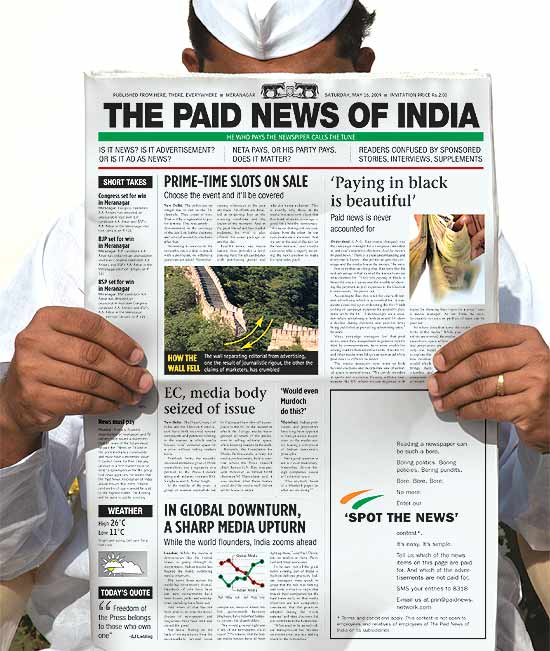The blurring line between News and Paid News

It is time for elections and time for money of all hues to flow like water. A favourable climate needs to be created and opinion needs to be bought or managed. It is perhaps the only time that newspaper space becomes a scarce commodity and like all scare commodities, it is time to charge a premium.
There is only so much time, and only so much of an attention span for the voter. The daily paper that he picks up from the door in the morning, becomes so much precious in those fifteen to twenty days of hectic campaigning.
It was in the 2004 elections that I heard about paid news. It was shocking and outrageous at first. It was repeated in 2009. The shock has worn off, and it would be a surprise if it is not repeated in 2014.
When I first heard of it in 2004 from a friend who was an election manager, I thought that it was the highly energetic political entrepreneurs of Andhra Pradesh who had thought of this simple strategy to gain the mindshare of the voters.
But later on, a Press Council of India sub-committee report had said that leading Hindi, Telugu, Gujarati and Marathi newspapers were involved in the episode.
The Press Council of India (PCI) has decided not to forward the detailed report on “paid news”, prepared by its sub-committee, following divisions within the Council, with some members objecting to the fact that specific media houses had been identified as offenders in that document.
The report of the sub-committee not only named the newspapers but also interviewed politicians who said they were given rate cards for the elections and who were informed, that if they were not to pay up, their election rallies would not be covered in the newspaper.
PCI in its report on paid news has recommended amendment to the Representations of the People Act 1951 to make incidence of paid news a punishable electoral malpractice and also demanded that it should be fully empowered to adjudicate the complaints of paid news and give final judgement in the matter.
The modus operandi is like this. The candidate would hire an agency or a group of writers during election time and articles praising him would be prepared. Most of it would range from how he is accessible to the poor, the farmers and the downtrodden. Great effort would be put in to whitewash his image and give him a pro-farmer, pro-poor and pro-women tilt.
The press council sub-committee found three newspapers carrying the same paid news report on the same day in Maharashtra. Many candidates were not so dumb. Most of the paid reports would be written exactly like a news report around some public meeting addressed by the candidate. A serious reader would easily spot the paid news, but a not-so-savvy reader may not spot it.
Guesstimates of money spent on Paid News for a parliament seat by each candidate range from Rs 75 lakh to Rs one crore. Some the newspapers had apparently protested and had wanted to show the article in a box or with a different font to communicate in a subtle way to their readers that it was not an original article. But candidates had seemingly forced the media houses against any such move as it would alert the election commission.
The issue was serious in Andhra Pradesh, as the state had a plethora of newspapers and some of them were struggling to pay salaries to their staff. The Paid News was normally was carried in the district and the assembly supplements of the newspapers, while the main paper was mercifully left out.
The problem is that during election time, it is difficult to curb spending what with the amounts of money that candidates are willing to spend. Newspapers which are facing competition from television and radio and which find itself in dire straits find in this an opportunity to shore up their finances.
This time too curbing of 'paid news' would be a herculean task though local cable channels might take a larger part of the spend. It all boils down to the extremely low level of spending allowed during election time. Maybe if the limits were raised, candidates might go in for a simple and straight forward advertisement rather than sneak in through Paid News.
Whatever be the rationale or the argument, this time around watch out for Unpaid News. It might be very difficult to spot it.
By Venkatesh Kannaiah
